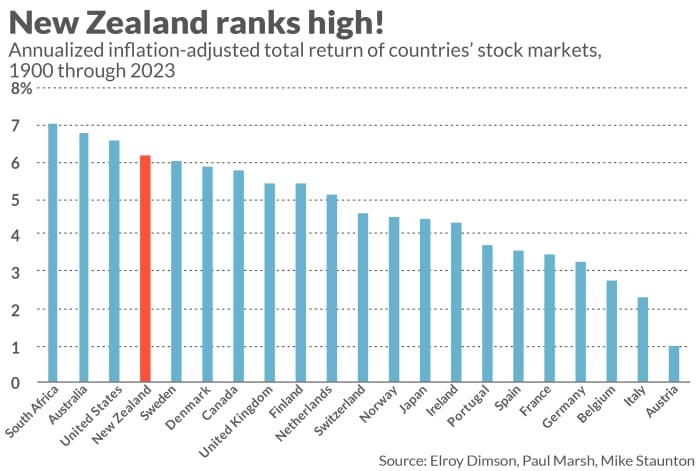The New Zealand stock market has something to teach U.S. investors about the risks and rewards of a high-yield market. This is because the New Zealand market is dominated by only a handful of large companies. In fact, it is one of the heaviest stock markets in the world.
Consider the MSCI New Zealand IMI 25/50 Index, which according to its creator is “designed to measure the performance of the large-, mid- and small-cap segments of the New Zealand market.” A company, Fisher & Paykel Healthcare FPH,
represents almost a quarter of the index. In the S&P 500 SPX index,
on the contrary, the weight of the largest stock, Microsoft MSFT,
– is 7.3%.
And Fisher & Paykel is no fluke. The second largest company in the MSCI New Zealand index, Auckland International Airport AIA,
has a weight of 22%. In contrast, the index weight of the S&P 500’s second largest stock, Apple AAPL,
– is 6.5%. The top five companies in the New Zealand index represent more than 60% of the index, while the top five in the S&P 500 represent approximately 25%.
The New Zealand stock market hasn’t always been dominated by big companies. But the distribution of its market capitalization has been highly skewed throughout its history. A century ago, for example, according to the UBS Global Investment Returns Yearbook, the country’s economy “was built on a few primary products, particularly wool, meat and dairy products.”
To appreciate the impact of a skewed distribution, consider how much of a difference it has made in the United States, with its relatively equal weight. According to Morningstar, the market-cap-weighted S&P 500 index, dominated by its largest companies, has produced a total return of 23.2% over the past year. That compares with a 6.4% return for the equally weighted version of the S&P 500.
Skewed market cap distributions work both ways. Sometimes they can lead to impressive performances, as was the case in New Zealand in the long term. According to the UBS yearbook, the country’s stock market has seen one of the best returns in the world since 1900, as you can see in this chart.

However, such concentration can easily lead to a market slowdown, as has happened in recent years in New Zealand. The iShares MSCI New Zealand ENZL Exchange Traded Fund has lagged the Vanguard Total World Stock ETF VT over the past year by 24 percentage points and over the past five years by about 9 percentage points.
The investment implication: Know what you’re buying when you invest in a market-cap-weighted index. You might think you’re buying shares of all the companies in that index, when you’re essentially investing in a few large companies that dominate that index. That’s not necessarily a bad idea, but it’s a completely different investment than buying equal-sized pieces from hundreds of companies.
Mark Hulbert is a regular contributor to MarketWatch. Its Hulbert Ratings tracks investment newsletters that pay a flat fee to be reviewed. He can be reached at mark@hulbertratings.com
Moreover: The ‘Magnificent Seven’ have skyrocketed, but it has historically been ‘profitable’ to bet against the biggest stocks
Read also: This group of stocks has actually kept pace with the Magnificent Seven and with far less risk